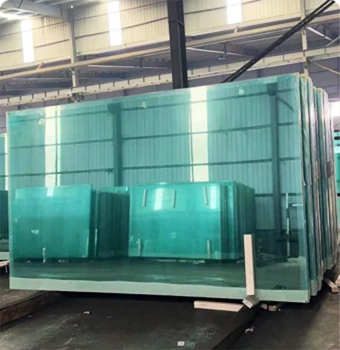Understanding Float Glass Its Meaning and Significance
Float glass is a term that refers to a particular manufacturing process used to produce flat glass, which is ubiquitous in our daily lives. The term float describes the method by which the glass is made, involving the careful floating of molten glass on a bed of molten tin. This innovative technique was first developed in the 1950s and has since revolutionized the glass manufacturing industry.
Understanding Float Glass Its Meaning and Significance
One of the significant advantages of float glass is its exceptional optical clarity. Due to the absence of bubbles and surface imperfections, float glass is ideal for applications where transparency is crucial, such as in windows, mirrors, and glass doors. Moreover, the quality of float glass makes it suitable for various finishing processes, including polishing, cutting, and coating, enhancing its versatility and functionality in different settings.
float glass means
The durability of float glass is another essential property. Its resistance to scratches and environmental factors makes it a preferred choice for both residential and commercial applications. Float glass is manufactured to meet a range of performance standards, ensuring that it can withstand extremes of temperature and pressure, thus increasing its lifespan and reliability.
In contemporary architecture, float glass plays a pivotal role in design aesthetics. Large expanses of glass are commonly used in modern buildings to promote natural light and create an illusion of openness. This has led to the emergence of energy-efficient designs, where float glass combined with various coatings can significantly reduce energy consumption by improving insulation and minimizing heat loss.
Furthermore, float glass is increasingly being utilized in the production of smart glass. This innovative development allows for adjustable transparency, enabling users to control the amount of light that enters a space. This technology is not only beneficial for energy efficiency but also for privacy, making it a popular choice in offices and homes.
In conclusion, float glass is more than just a common material; it represents a sophisticated manufacturing process that delivers high-quality, versatile products. Its unique properties—optical clarity, durability, and adaptability—make it integral to various industries, from construction to consumer goods. As technology advances, the applications of float glass continue to expand, underscoring its significance in modern design and sustainability efforts. Whether used in everyday windows or cutting-edge architectural designs, float glass embodies both functionality and aesthetic appeal, illustrating its enduring impact on our built environment.
 Afrikaans
Afrikaans  Albanian
Albanian  Amharic
Amharic  Arabic
Arabic  Armenian
Armenian  Azerbaijani
Azerbaijani  Basque
Basque  Belarusian
Belarusian  Bengali
Bengali  Bosnian
Bosnian  Bulgarian
Bulgarian  Catalan
Catalan  Cebuano
Cebuano  Corsican
Corsican  Croatian
Croatian  Czech
Czech  Danish
Danish  Dutch
Dutch  English
English  Esperanto
Esperanto  Estonian
Estonian  Finnish
Finnish  French
French  Frisian
Frisian  Galician
Galician  Georgian
Georgian  German
German  Greek
Greek  Gujarati
Gujarati  Haitian Creole
Haitian Creole  hausa
hausa  hawaiian
hawaiian  Hebrew
Hebrew  Hindi
Hindi  Miao
Miao  Hungarian
Hungarian  Icelandic
Icelandic  igbo
igbo  Indonesian
Indonesian  irish
irish  Italian
Italian  Japanese
Japanese  Javanese
Javanese  Kannada
Kannada  kazakh
kazakh  Khmer
Khmer  Rwandese
Rwandese  Korean
Korean  Kurdish
Kurdish  Kyrgyz
Kyrgyz  Lao
Lao  Latin
Latin  Latvian
Latvian  Lithuanian
Lithuanian  Luxembourgish
Luxembourgish  Macedonian
Macedonian  Malgashi
Malgashi  Malay
Malay  Malayalam
Malayalam  Maltese
Maltese  Maori
Maori  Marathi
Marathi  Mongolian
Mongolian  Myanmar
Myanmar  Nepali
Nepali  Norwegian
Norwegian  Norwegian
Norwegian  Occitan
Occitan  Pashto
Pashto  Persian
Persian  Polish
Polish  Portuguese
Portuguese  Punjabi
Punjabi  Romanian
Romanian  Russian
Russian  Samoan
Samoan  Scottish Gaelic
Scottish Gaelic  Serbian
Serbian  Sesotho
Sesotho  Shona
Shona  Sindhi
Sindhi  Sinhala
Sinhala  Slovak
Slovak  Slovenian
Slovenian  Somali
Somali  Spanish
Spanish  Sundanese
Sundanese  Swahili
Swahili  Swedish
Swedish  Tagalog
Tagalog  Tajik
Tajik  Tamil
Tamil  Tatar
Tatar  Telugu
Telugu  Thai
Thai  Turkish
Turkish  Turkmen
Turkmen  Ukrainian
Ukrainian  Urdu
Urdu  Uighur
Uighur  Uzbek
Uzbek  Vietnamese
Vietnamese  Welsh
Welsh  Bantu
Bantu  Yiddish
Yiddish  Yoruba
Yoruba  Zulu
Zulu 

